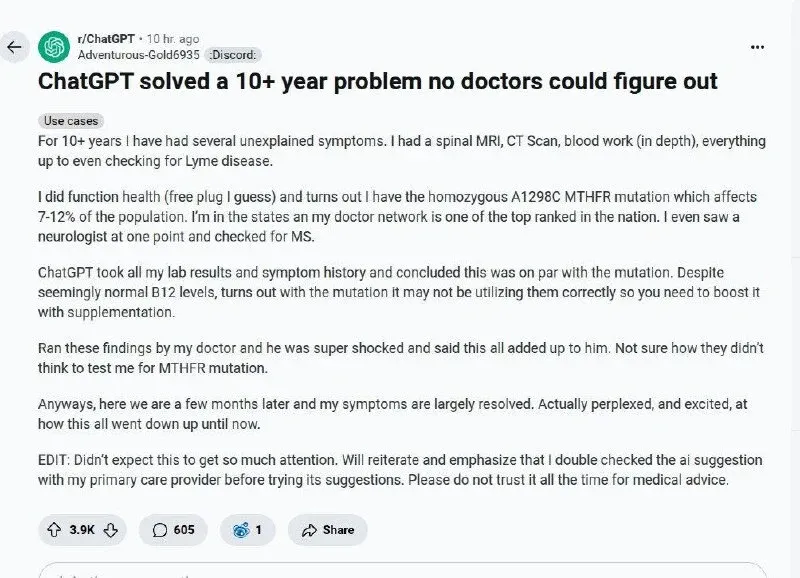How ChatGPT Solved a Medical Mystery That Doctors Couldn't Crack for Over 10 Years
-

Let’s be honest: how many doctors in the world can actually handle non-obvious, complex medical cases? Maybe 1% — if that. And how many of those have you personally seen? Exactly.
The author of this story had mysterious symptoms for over a decade. They did everything: spinal MRIs, CT scans, deep lab diagnostics, even got tested for Lyme disease. One doctor even suspected multiple sclerosis. But nothing. Just shrugs. No diagnosis. No answers.
Then one day, the person decided to run all their lab results and a detailed symptom history through ChatGPT — just to see what happens.
And that’s when everything changed.
The model connected the dots and pointed to a mutation: A1298C in the MTHFR gene. Around 7–12% of people carry this mutation, but it’s rarely checked by default. In this case, B12 levels looked “normal,” but with this mutation, the body may not absorb B12 properly. That alone can cause all sorts of issues. ChatGPT spotted it.
The user took this insight to their doctor — and the doctor was stunned. Everything made sense. No one had thought to test for this mutation before.
A few months into the right treatment plan, most of the symptoms have almost completely disappeared. The author still can’t believe this went undiagnosed for so long.
 Important note: the user didn’t just follow ChatGPT blindly. Every single recommendation was double-checked and confirmed with their physician. ChatGPT is not a replacement for doctors — but it is an incredibly powerful tool to:
Important note: the user didn’t just follow ChatGPT blindly. Every single recommendation was double-checked and confirmed with their physician. ChatGPT is not a replacement for doctors — but it is an incredibly powerful tool to:process huge amounts of data uncover hidden connections suggest new directions for testing and most importantly — help figure out which specialist to see nextSo what’s the real issue?
Many doctors are simply overwhelmed and outdated. They don’t have time to keep up with every new study. They don’t stay current with global databases. They do their best, but they miss things.
AI doesn’t.
That’s why we desperately need to integrate AI into early diagnostic screening. Let the neural network suggest hypotheses, and let the doctor verify them. But that only works if doctors are willing to collaborate with AI — not compete with it.
Another big question: how will this change medical education? Traditionally, being a good doctor means remembering thousands of facts and using pattern recognition to link symptoms, tests, and experience. But if AI does that faster and better... what’s the role of a human doctor in five years?
Kind of like that old joke:
— Doctor, why is my appendix scar on the wrong side? — (in ChatGPT voice) Thank you for noticing the mistake. Recalculating...On a personal note:
I’ve had hypertension since I was 10. Diagnosed, but unexplained. Dozens of tests over 30 years, and no one ever found the root cause. They just call it “essential hypertension” — aka, “we don’t know why.” I’ve been taking meds daily ever since.
Maybe it’s time to run my entire medical history through ChatGPT too. Just to see what it might find. Maybe — just maybe — the answer’s been hiding in plain sight all along.
Anyone else want to start an AI-powered diagnosis challenge?

#crypto #AI #ChatGPT #Coin

















